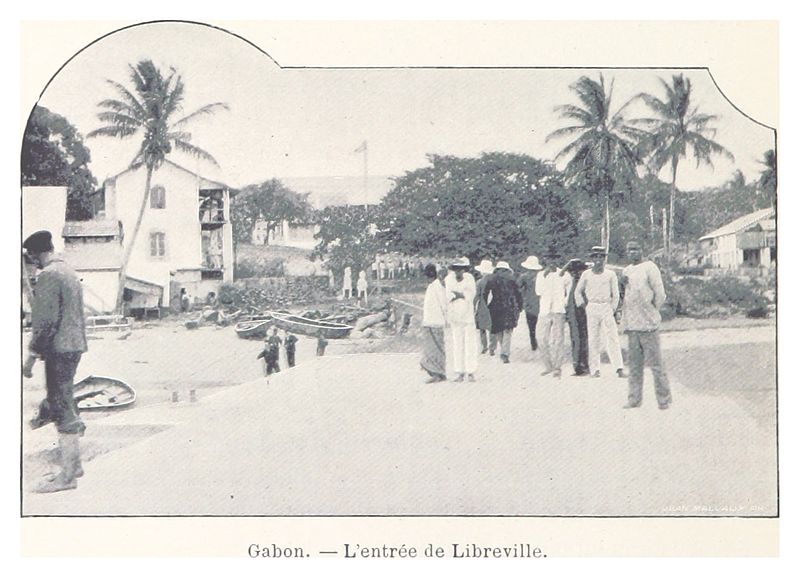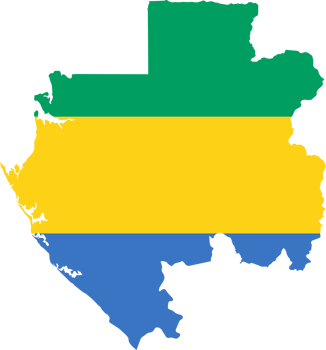<= 77. Central African Republic 79. Burundi =>
1. Gabon Name Origins
The Portuguese sailed to Gabon in the 1470s as the first Europeans. The Portuguese gave the region the name "Gabão", which means a cloak. The shape of the region reminded a cloak so that was the reason for the name. After the Portuguese, Dutch, British and French merchants arrived at the area trading lumber, ivory and slaves. The rough coast didn't although attract many Europeans to settle permanently before the 1800s.
2. Libreville
In 1849 the French captured the slave ship Elizia and 52 slaves were freed. These slaves settled at the river bank establishing the city of Libreville, which means Freetown in English. Many freed slaves moved to the city and in 1885 it became the capital city of the French Congo which included the current nations of Gabon and Congo Republic.
5. President for 41 years
Omar Bongo was the president of Gabon between 1967-2009, almost 42 years. Gabon has had only three presidents during its independence since 1960. The first president was the favorite of the French, Leon M'Ba.
Omar Bongo was M'Ba's vice president and after the death of M'Ba, Bongo became the president. First he made his party PDG the only allowed party in the country and ruled until 2009 when he died. After Omar Bongo's death his son Ali Bongo Ondimba became the president of Gabon.
Omar Bongo defeated many general strikes and demonstrations requiring more even wealth distribution, less corruption and more democracy. Especially the French helped Omar Bongo like in the demonstrations of 1990. In Gabon the president has very large political powers.
Gabonese presidents
1960-1967 Leon M'Ba
1967-2009 Omar Bongo
2009- Ali Bongo Ondimba
Timeline
1. Gabon Name Origins
The Portuguese sailed to Gabon in the 1470s as the first Europeans. The Portuguese gave the region the name "Gabão", which means a cloak. The shape of the region reminded a cloak so that was the reason for the name. After the Portuguese, Dutch, British and French merchants arrived at the area trading lumber, ivory and slaves. The rough coast didn't although attract many Europeans to settle permanently before the 1800s.
2. Libreville
In 1849 the French captured the slave ship Elizia and 52 slaves were freed. These slaves settled at the river bank establishing the city of Libreville, which means Freetown in English. Many freed slaves moved to the city and in 1885 it became the capital city of the French Congo which included the current nations of Gabon and Congo Republic.
 |
| Libreville |
3. Albert Schweizer
In 1913 the French doctor Albert Schweitzer established a hospital in Lambaréné along the Ogooe River with his nurse wife. There Albert treated thousands of patients already in the first year treating various diseases. Some patients had even travelled days and hundreds of kilometers to reach him.
In 1952 Albert Schweitzer was rewarded with the Nobel Peace Prize for his humanitarian work in Gabon, although he received the prize in 1953. Albert used the prize money to construct a hospital for people suffering from leper.
In 1913 the French doctor Albert Schweitzer established a hospital in Lambaréné along the Ogooe River with his nurse wife. There Albert treated thousands of patients already in the first year treating various diseases. Some patients had even travelled days and hundreds of kilometers to reach him.
In 1952 Albert Schweitzer was rewarded with the Nobel Peace Prize for his humanitarian work in Gabon, although he received the prize in 1953. Albert used the prize money to construct a hospital for people suffering from leper.
Gabon has one of the highest GDPs in Africa but the wealth is distributed unevenly. The economy is largely in the hands of foreign companies exploiting Gabon's vast natural resources like uranium, gold, oil and manganese. A lot of forests have been destroyed to get lumber, agriculture is undeveloped and most of the foodstuff are imported.
The majority of the population live in subsistence economy. With a small population of 1,5 million people Gabon could have even better living standards with a 6th lowest population density in Africa. The healthcare system is although much better than in most of the African countries.
The majority of the population live in subsistence economy. With a small population of 1,5 million people Gabon could have even better living standards with a 6th lowest population density in Africa. The healthcare system is although much better than in most of the African countries.
 |
| Natural resources in Gabon |
Omar Bongo was the president of Gabon between 1967-2009, almost 42 years. Gabon has had only three presidents during its independence since 1960. The first president was the favorite of the French, Leon M'Ba.
Omar Bongo was M'Ba's vice president and after the death of M'Ba, Bongo became the president. First he made his party PDG the only allowed party in the country and ruled until 2009 when he died. After Omar Bongo's death his son Ali Bongo Ondimba became the president of Gabon.
Omar Bongo defeated many general strikes and demonstrations requiring more even wealth distribution, less corruption and more democracy. Especially the French helped Omar Bongo like in the demonstrations of 1990. In Gabon the president has very large political powers.
Gabonese presidents
1960-1967 Leon M'Ba
1967-2009 Omar Bongo
2009- Ali Bongo Ondimba
 |
| Omar Bongo |
1470s The Portuguese arrived to the area first being followed by the Dutch, British and French merchants who acquired ivory, lumber and slaves from the area
1849 Slaves who were freed from a shipped established the city of Libreville, where many former slaves moved
1885 The area of Gabon was officially announced as a French colony
1910 Gabon, Chad and Central African Republic form together the French colony of French Equatorial Africa
1958 Gabon got autonomy
1960 Gabon and the three other French Equatorial African colonies get independence in one week in September. Leon M'Ba was the first president of Gabon
1964 M'Ba is overthrown in a coup but the French troops restored M'Ba into power
1967 M'Ba dies and the vice president Omar Bongo becomes the president
1990 The discontent erupted into general strike and protests which the French troops suppressed
2003 The constitution was changed to allow Bongo continue his presidency
2009 Bongo dies after 41 years in power and his son Ali Bongo Ondimba followed his father as the president
Sources:
https://en.wikipedia.org/wiki/Gabon
"Maailman maat liput ja historia" by Kimmo Kiljunen
https://en.wikipedia.org/wiki/Omar_Bongo
https://en.wikipedia.org/wiki/List_of_longest-ruling_non-royal_national_leaders_since_1900
"Maailman maat liput ja historia" by Kimmo Kiljunen
https://en.wikipedia.org/wiki/Omar_Bongo
https://en.wikipedia.org/wiki/List_of_longest-ruling_non-royal_national_leaders_since_1900



No comments:
Post a Comment